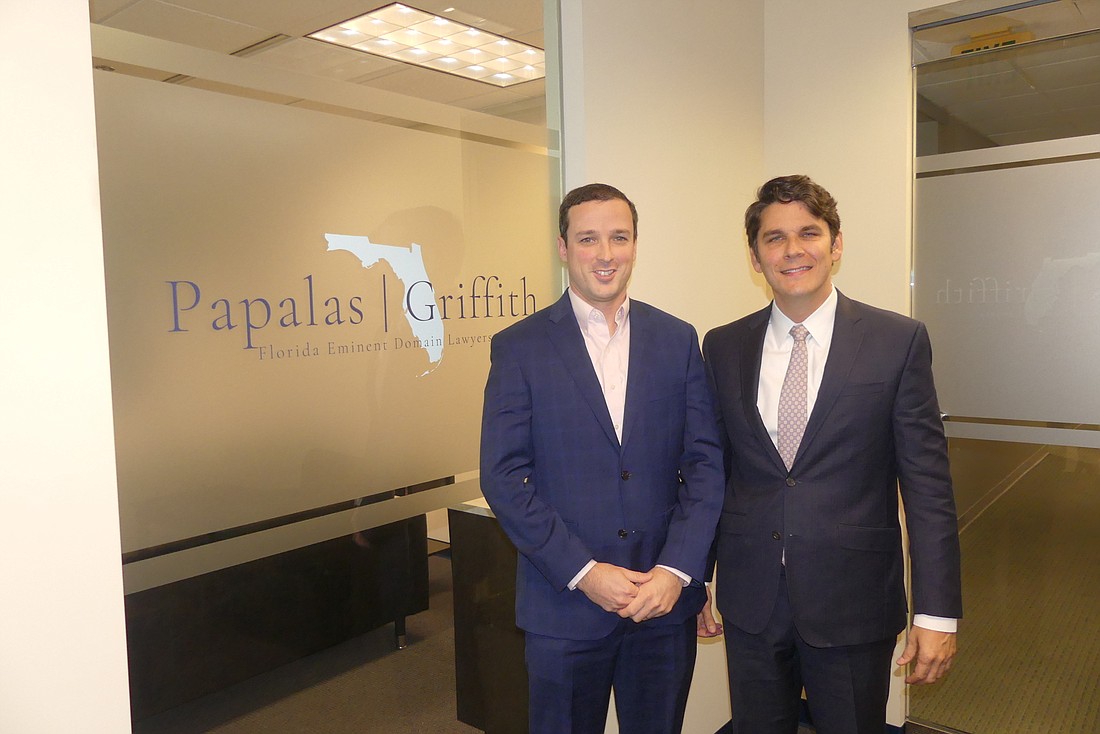
If the federal, state or local government decides it needs all or part of a private property for a public purpose or project, it will legally take the property.
While the eventual outcome of such an action is rarely in question, how the property owner will be compensated for the involuntary loss often comes into question.
Resolving disputes between property owners and what’s called “condemning authorities” is the practice focus for Menelaos “Manny” Papalas and Chuck Griffith at Papalas | Griffith.
“We like to get out in front of it, as soon as we know it’s coming,” Papalas said.
The firm monitors government agencies that condemn private property through eminent domain for infrastructure improvement projects such as roads.
“We bring that information to people who are going to have takings. It benefits them to be thinking about it as far in advance as they can. It’s even better if they have us thinking about it,” Papalas said.
The amount of compensation for the property taken is usually the issue. Condemning authorities tend to be conservative in their initial assessment of the fair value of property that will be taken through eminent domain.
“Sometimes, the government doesn’t know what’s unique about a property or doesn’t understand its value,” Griffith said.
For example, the firm represented a group of clients that owned land and businesses on a side street extending from a main commercial road that was being improved.
The change to the side street was limited to installation of a sidewalk, so the government made small offers to the landowners.
The offers were for only the value of the land under the proposed new sidewalk, but the road project would have “very significant impacts on the businesses and the land values” during construction, Papalas said.
He said one of the clients was a food-testing laboratory with customers that had to have easy access to the business, otherwise, samples could spoil and endanger the laboratory’s bottom line.
“The county offered the food lab $3,100 and the ultimate recovery was $640,000,” Papalas said.
Another business adjacent to the project owned a vacant office building.
Papalas said local knowledge of the road project and its expected traffic impact prevented the owner from leasing the building during the construction.
The county offered the owner less than $15,000; the recovery was $355,000.
Papalas said the third client was a dry cleaner – one of the most convenience-oriented business types.
The government offered the business owner no compensation because he was a tenant, not the property owner. Legally, he could seek only lost profits as business damages.
The firm reached a settlement of $144,000 for the client.
“Sometimes, we represent sophisticated real estate clients who understand the issues, but for more than half of our clients, it’s a one-time deal for them,” Griffith said.
The government’s authority to condemn and take private property for public projects is limited by the U.S. Constitution and also by the state constitution.
Papalas said the first eminent domain actions in Florida were related to the expansion of railroads as the state became a destination for tourists and developers.
The state moved to protect landowners from unfair property forfeiture by law and pays the legal fees for property owners with eminent domain disputes.
“Florida really puts people on a level playing field,” Papalas said.